A MySQL developer plays a key role in managing and optimizing databases that store and organize data for your applications. They ensure data integrity, performance, and security while working closely with other developers to support application functionality.
MySQL development skills include proficiency in SQL queries, database design, and performance tuning, as well as soft skills like analytical thinking and teamwork.
Candidates can write these abilities in their resumes, but you can’t verify them without on-the-job MySQL Developer skill tests.
In this post, we will explore 8 essential MySQL Developer skills, 8 secondary skills and how to assess them so you can make informed hiring decisions.
Table of contents
8 fundamental MySQL Developer skills and traits
The best skills for MySQL Developers include SQL Proficiency, Database Design, Performance Tuning, Data Security, Backup Management, Replication Techniques, Debugging and Version Control.
Let’s dive into the details by examining the 8 essential skills of a MySQL Developer.
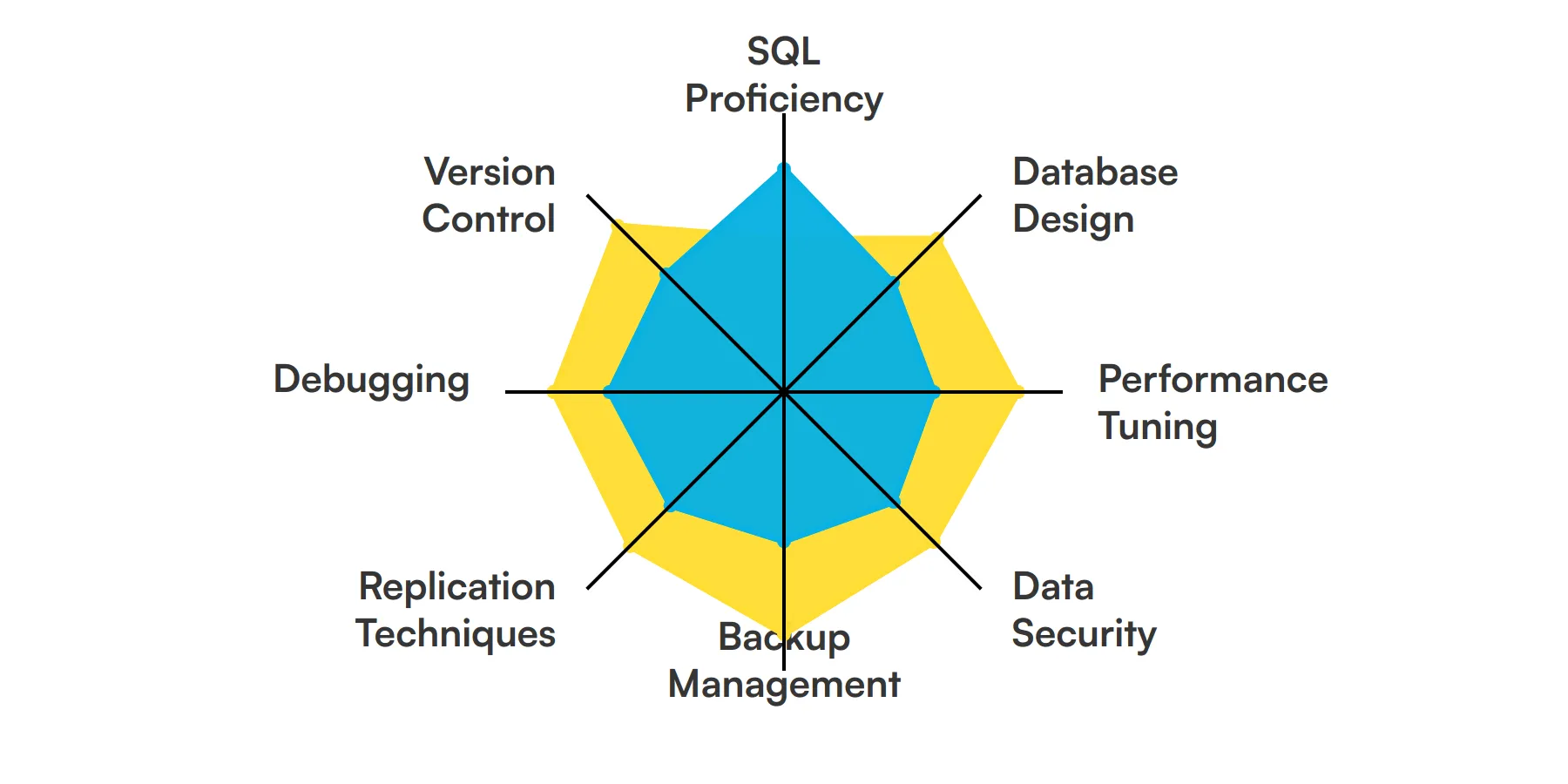
SQL Proficiency
A MySQL Developer must have a deep understanding of SQL, the primary language used for managing and manipulating databases. This skill is fundamental for writing queries, updating data, and creating new databases and tables, which are daily tasks in this role.
For more insights, check out our guide to writing a SQL Developer Job Description.
Database Design
Effective database design is critical for ensuring data integrity and optimizing performance. A MySQL Developer uses this skill to structure a database properly, considering the relationships between different data points and how they will be accessed.
Performance Tuning
Performance tuning involves optimizing SQL queries and server configurations to enhance database efficiency and response times. A MySQL Developer needs this skill to ensure that applications relying on the database run smoothly and efficiently.
Data Security
Ensuring the security of data within a database is paramount. A MySQL Developer uses this skill to implement security measures such as access controls and encryption to protect sensitive information from unauthorized access.
Check out our guide for a comprehensive list of interview questions.
Backup Management
Regular backups are essential to prevent data loss. A MySQL Developer must be skilled in setting up and managing backup protocols, ensuring that data can be recovered quickly and effectively in case of a system failure.
Replication Techniques
Replication is used for data redundancy and load balancing. A MySQL Developer must understand various replication techniques to ensure data availability and consistency across multiple servers or locations.
Debugging
Debugging involves identifying and resolving issues within the database or related applications. A MySQL Developer uses this skill to troubleshoot errors and ensure that the database operates as intended.
Version Control
Understanding version control is necessary for managing changes to the database scripts and collaborating with other developers. A MySQL Developer uses tools like Git to track changes, revert to previous versions, and maintain the integrity of the database code.
8 secondary MySQL Developer skills and traits
The best skills for MySQL Developers include Scripting Languages, Data Analysis, Cloud Services, API Integration, Agile Methodologies, UI/UX Basics, Documentation and Project Management.
Let’s dive into the details by examining the 8 secondary skills of a MySQL Developer.
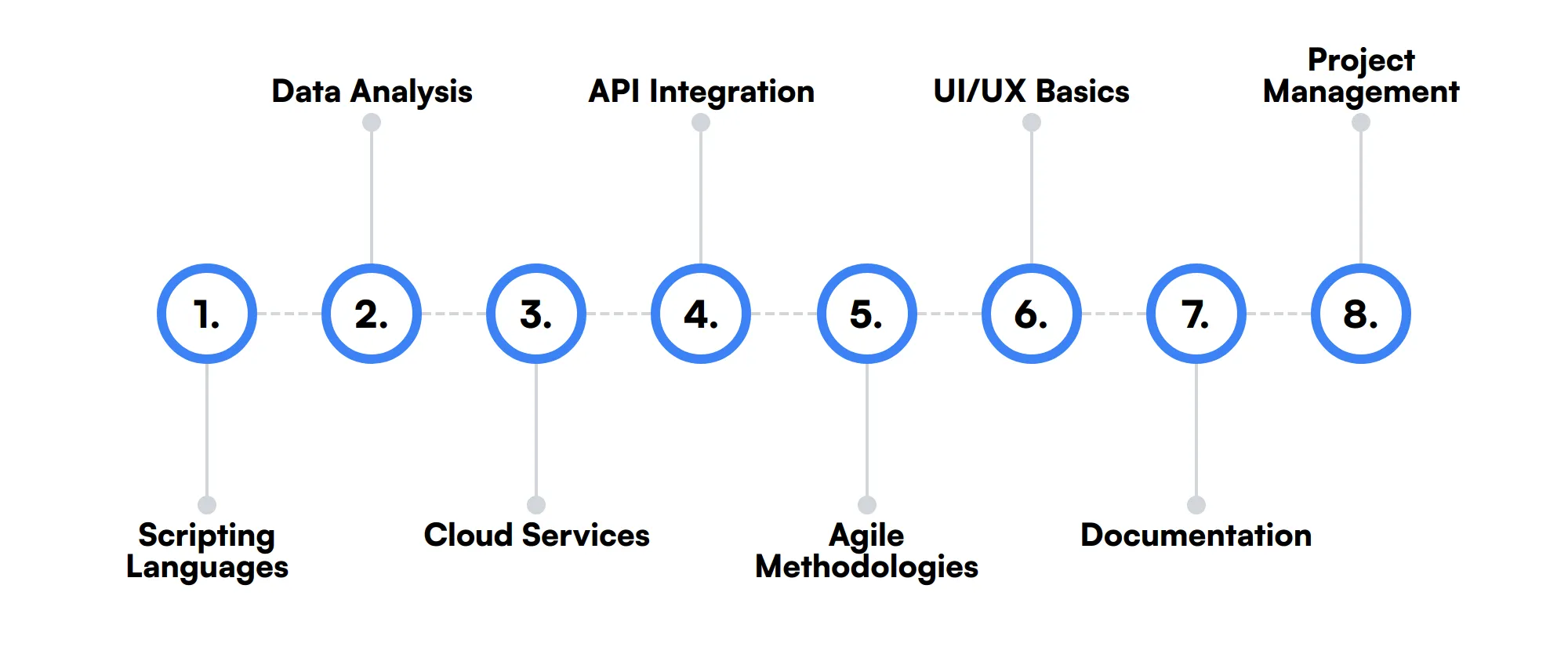
Scripting Languages
Knowledge of scripting languages such as Python or PHP is beneficial for automating database tasks and integrating the database with other applications.
Data Analysis
Ability to analyze data helps in generating insights and making data-driven decisions. A MySQL Developer might need to write queries that help others understand trends and patterns.
Cloud Services
Familiarity with cloud services like AWS or Azure is useful as many databases are now hosted on the cloud. This knowledge helps in managing and scaling databases in a cloud environment.
API Integration
Skills in API integration enable a MySQL Developer to connect and interact with other software applications, enhancing the functionality and utility of the database.
Agile Methodologies
Experience with agile methodologies can be beneficial as it helps in adapting to changes quickly and working efficiently in teams focused on rapid development cycles.
UI/UX Basics
Understanding the basics of UI/UX can assist a MySQL Developer in creating more effective database management tools and ensuring that the end-user can interact with the data effectively.
Documentation
Strong documentation skills are necessary to ensure that the database setup and modifications are well recorded, aiding in maintenance and compliance.
Project Management
Basic project management skills help a MySQL Developer to oversee database projects, manage timelines, and coordinate with other team members effectively.
How to assess MySQL Developer skills and traits
Assessing the skills and traits of a MySQL Developer can be a challenging task. It's not just about knowing SQL; it's about understanding how to design databases, tune performance, ensure data security, manage backups, and more. A resume might list these skills, but it won't tell you how proficient the candidate is or if they are the right fit for your specific needs.
To confidently gauge a candidate's competencies, skills-based hiring practices like talent assessments are invaluable. These assessments can help you understand a candidate's proficiency in key areas such as SQL proficiency, database design, performance tuning, data security, backup management, replication techniques, debugging, and version control. Adaface on-the-job skill tests can help you achieve a 2x improved quality of hires and an 85% reduction in screening time.
Let’s look at how to assess MySQL Developer skills with these 4 talent assessments.
MySQL Online Test
Our MySQL Online Test evaluates a candidate's proficiency in MySQL, focusing on their ability to design databases, execute SQL queries, and manage data through various MySQL functionalities.
The test assesses their understanding of database design, SQL queries, normalization, indexing, joins, and transactions. It also evaluates their skills in using Data Manipulation Language, Data Definition Language, views, stored procedures, and triggers.
Successful candidates demonstrate a thorough ability to handle complex database scenarios, optimize query performance, and implement security measures in MySQL environments.

Data Modeling Skills Test
Our Data Modeling Skills Test measures a candidate's expertise in data modeling and database design, crucial for structuring and managing enterprise data effectively.
This test covers key areas such as SQL, ER diagrams, normalization, relational schema, data integrity, and data transformation. It challenges candidates to apply these concepts in practical scenarios.
Candidates who excel in this test are adept at creating efficient data models, ensuring data accuracy, and transforming data to meet business needs.
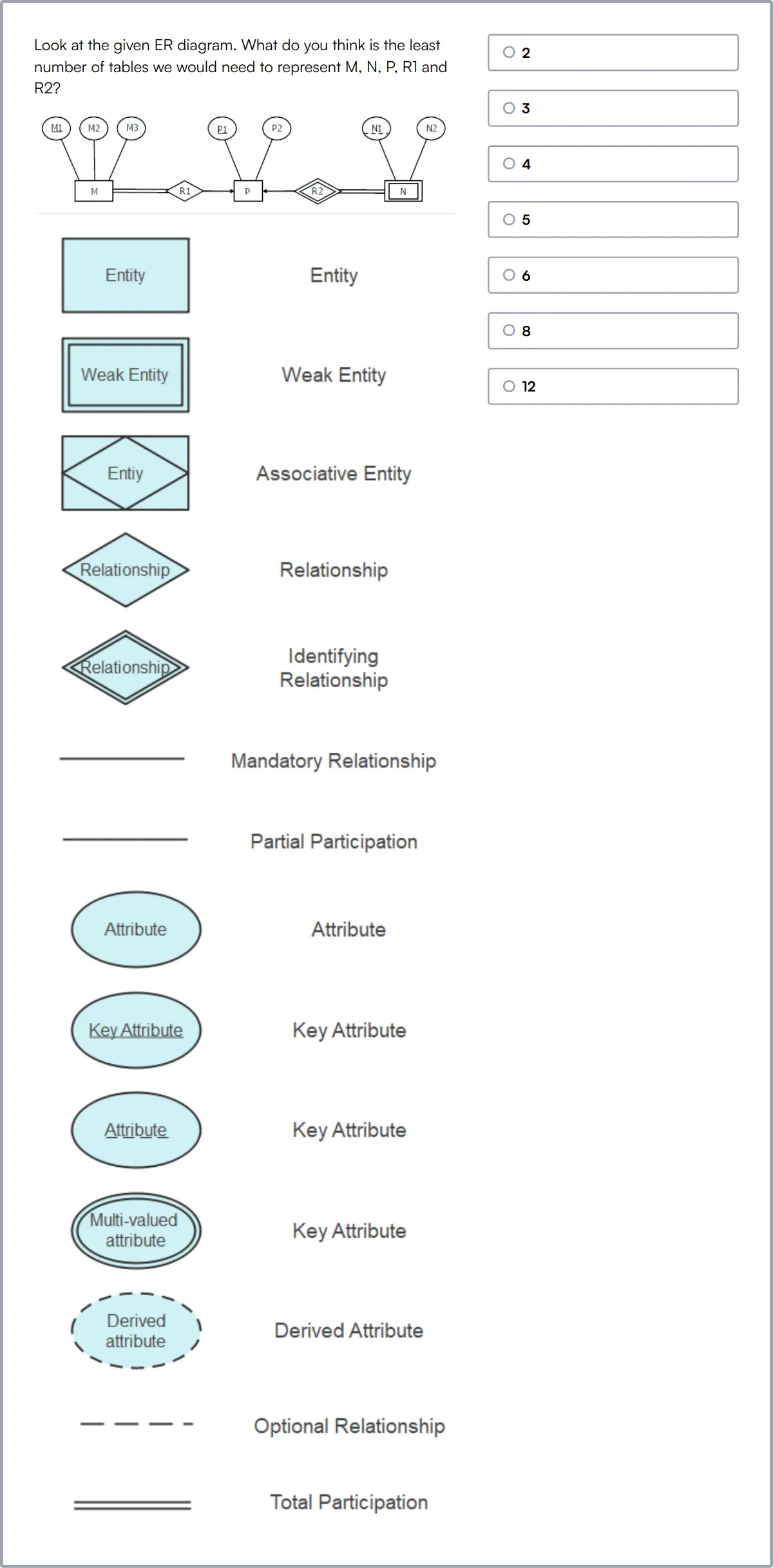
Cyber Security Assessment Test
The Cyber Security Assessment Test gauges a candidate's knowledge in cybersecurity, including network security, cyber attacks, and data protection strategies.
Candidates are tested on their understanding of network protocols, cybersecurity attacks like DoS/DDoS, cryptography, web security practices such as SQL injections and XSS, and data security measures.
High-scoring individuals are proficient in identifying vulnerabilities, implementing security measures, and managing data governance to safeguard information against cyber threats.
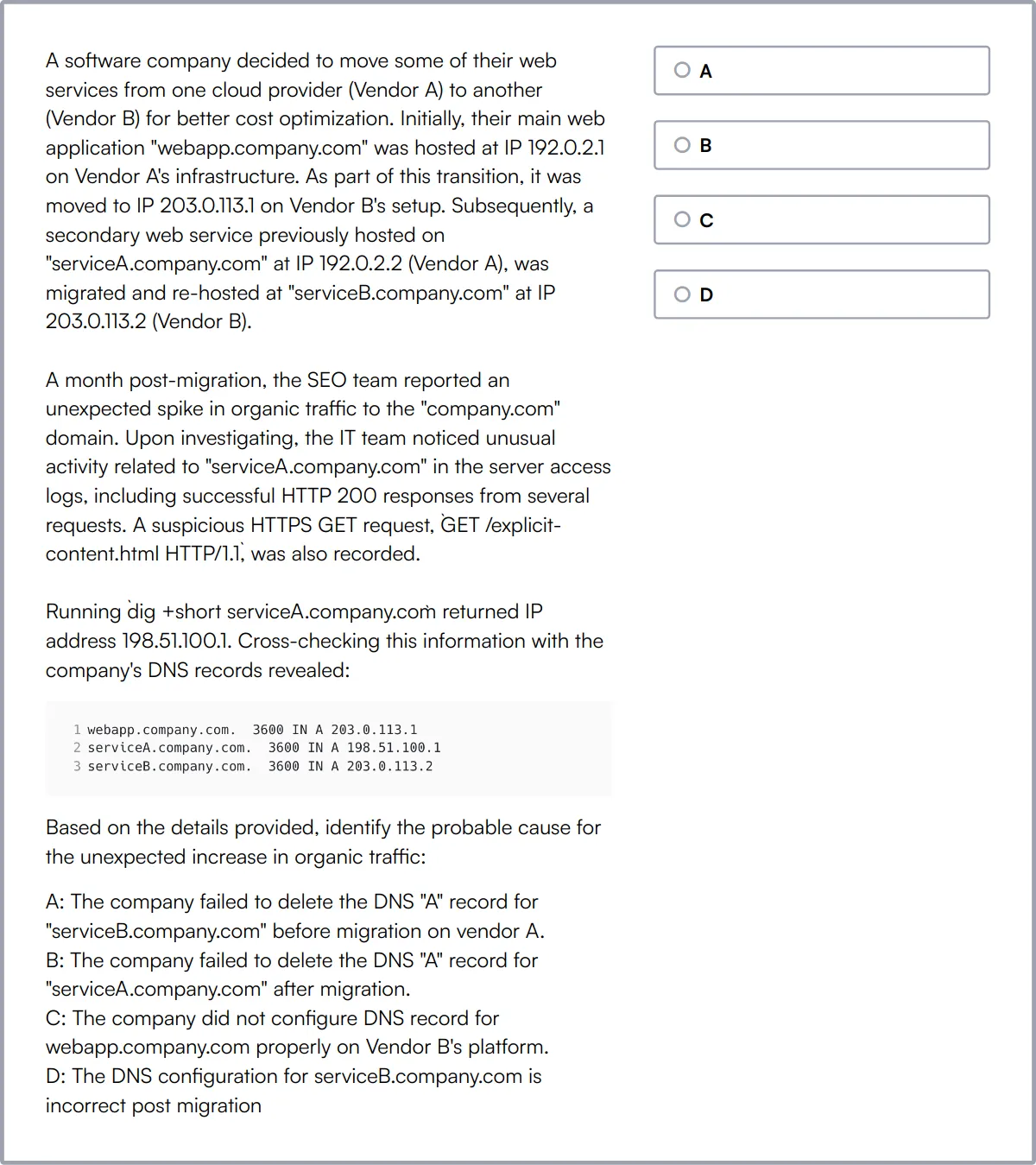
Git Online Test
Our Git Online Test assesses a candidate's understanding of Git, focusing on repository management, branching, merging, and version control best practices.
The test evaluates their ability to use Git commands, manage conflicts, work with remote repositories, and understand Git workflows and branching models.
Candidates who perform well on this test demonstrate strong capabilities in source code management and the ability to collaborate effectively using Git in a team environment.
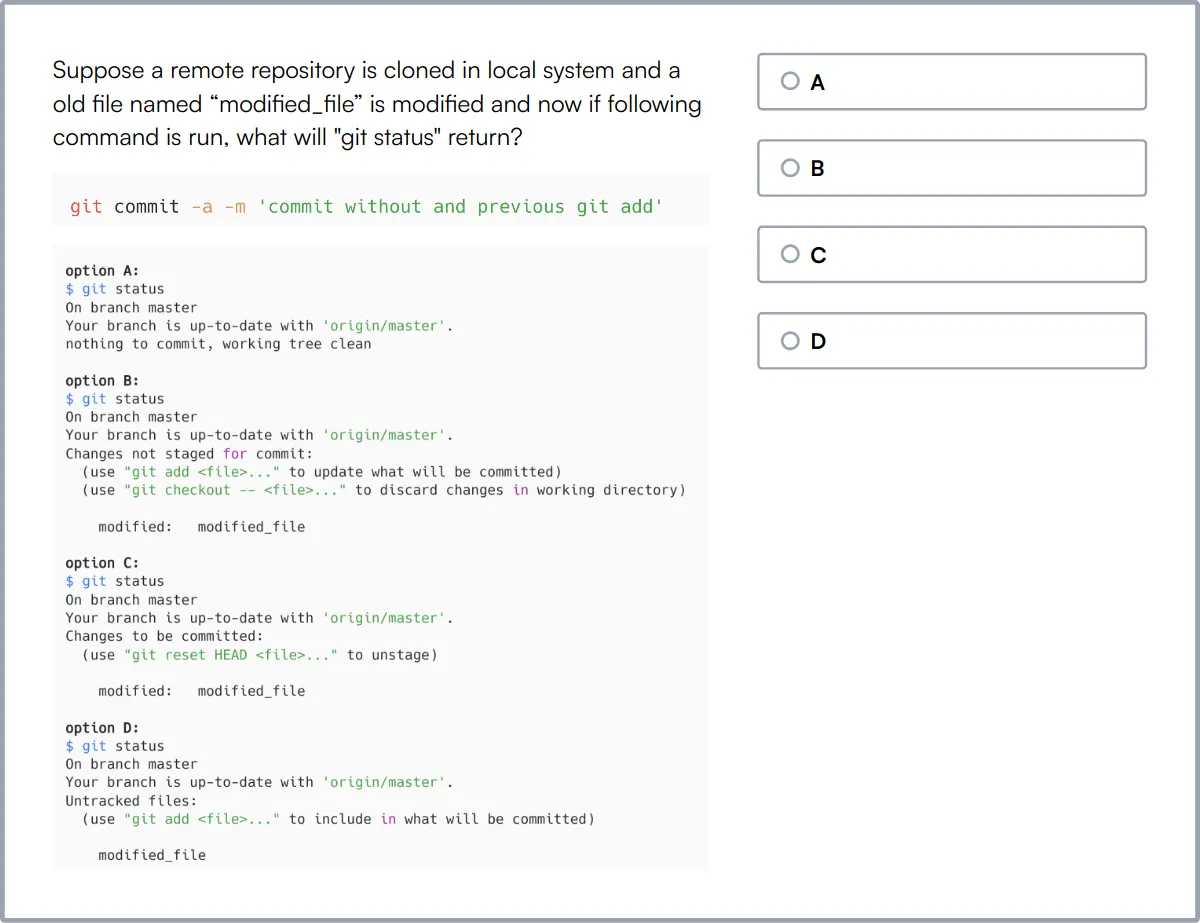
Summary: The 8 key MySQL Developer skills and how to test for them
| MySQL Developer skill | How to assess them |
|---|---|
| 1. SQL Proficiency | Evaluate ability to write and optimize complex queries. |
| 2. Database Design | Assess skills in creating scalable and normalized database schemas. |
| 3. Performance Tuning | Check expertise in optimizing database performance and query execution. |
| 4. Data Security | Gauge knowledge of implementing security measures to protect data. |
| 5. Backup Management | Review experience in setting up and managing database backups. |
| 6. Replication Techniques | Determine proficiency in configuring and managing database replication. |
| 7. Debugging | Assess ability to identify and resolve database issues. |
| 8. Version Control | Evaluate experience with version control systems for database changes. |
MySQL Online Test
MySQL Developer skills FAQs
What are the key skills required for a MySQL Developer?
A MySQL Developer should have strong SQL proficiency, database design skills, performance tuning, data security, and backup management. Knowledge of replication techniques, debugging, and version control is also important.
How can I assess a candidate's SQL proficiency?
You can assess SQL proficiency through technical tests that include writing complex queries, optimizing existing queries, and understanding joins, indexes, and transactions.
What should I look for in a candidate's database design skills?
Evaluate their ability to create normalized schemas, design efficient table structures, and understand relationships between tables. Ask for examples of past projects or give them a design problem to solve.
How do I evaluate a candidate's performance tuning skills?
Ask about their experience with query optimization, indexing strategies, and analyzing execution plans. Practical tests involving performance issues can also be useful.
Why is data security important for a MySQL Developer?
Data security ensures that sensitive information is protected from unauthorized access and breaches. Assess their knowledge of encryption, user permissions, and secure coding practices.
What is the role of backup management in MySQL development?
Backup management is crucial for data recovery in case of failures. Evaluate their experience with backup strategies, tools, and restoring data from backups.
How can I test a candidate's knowledge of replication techniques?
Ask about their experience with master-slave replication, multi-master replication, and handling replication lag. Practical scenarios or problem-solving questions can be effective.
What scripting languages should a MySQL Developer know?
A MySQL Developer should be familiar with scripting languages like Python, PHP, or Bash for automating tasks and integrating with other systems. Assess their ability to write and understand scripts.

40 min skill tests.
No trick questions.
Accurate shortlisting.
We make it easy for you to find the best candidates in your pipeline with a 40 min skills test.
Try for freeRelated posts
Free resources



